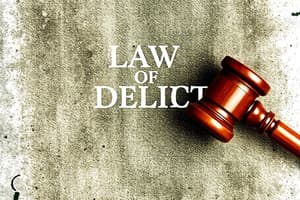Podcast
Questions and Answers
What is typically necessary for the conclusion of a contract?
What is typically necessary for the conclusion of a contract?
- Agreement on the time of delivery
- Agreement on the nature, subject, and price (correct)
- Agreement on the payment method
- Agreement on the location of the contract
In the context of contractual obligations, who is referred to as the pursuer?
In the context of contractual obligations, who is referred to as the pursuer?
- The party raising an action (correct)
- The party providing consideration
- The party that agrees to the terms
- The party receiving payment
What is the primary basis for negotiating with the other party in a contractual dispute?
What is the primary basis for negotiating with the other party in a contractual dispute?
- The emotional response of the parties
- The mutual understanding of terms
- The infallibility of the contract
- The possibility of legal action (correct)
What was Frederic's response to Adham's initial offer for the bike?
What was Frederic's response to Adham's initial offer for the bike?
Which scenario demonstrated a lack of consensus or agreement in a contract?
Which scenario demonstrated a lack of consensus or agreement in a contract?
How is consensus viewed in the context of contracts?
How is consensus viewed in the context of contracts?
In the case of Muirhead and Turnbull v Dickson, what was under dispute?
In the case of Muirhead and Turnbull v Dickson, what was under dispute?
What is the role of the defender in a contractual dispute?
What is the role of the defender in a contractual dispute?
What occurs after an invitation to treat is accepted?
What occurs after an invitation to treat is accepted?
In the context of Carlill v Carbolic Smokeball Co, what was the nature of the advertisement?
In the context of Carlill v Carbolic Smokeball Co, what was the nature of the advertisement?
What is the effect of a counter-offer?
What is the effect of a counter-offer?
When does an offer typically lapse?
When does an offer typically lapse?
Which of the following accurately describes acceptance?
Which of the following accurately describes acceptance?
What stipulation can an offeror make regarding acceptance?
What stipulation can an offeror make regarding acceptance?
What determines whether a statement can be considered an offer?
What determines whether a statement can be considered an offer?
In the case of Boots’ self-service system, when was the contract formed?
In the case of Boots’ self-service system, when was the contract formed?
What can be said about the nature of advertisements in general?
What can be said about the nature of advertisements in general?
In the case of Mathieson Gee (Ayrshire) LTD v Quigley, what was the result regarding the existence of a contract?
In the case of Mathieson Gee (Ayrshire) LTD v Quigley, what was the result regarding the existence of a contract?
Which of the following statements is classified as an invitation to treat?
Which of the following statements is classified as an invitation to treat?
According to the legal definitions provided, who is referred to as the offeror?
According to the legal definitions provided, who is referred to as the offeror?
Which case emphasizes the principle that an accepted offer creates a contract?
Which case emphasizes the principle that an accepted offer creates a contract?
What is the primary distinction between an offer and an invitation to treat?
What is the primary distinction between an offer and an invitation to treat?
What essential element was lacking in the agreement between MG and Q that resulted in no contract?
What essential element was lacking in the agreement between MG and Q that resulted in no contract?
Which statement correctly identifies what constitutes a legal offer?
Which statement correctly identifies what constitutes a legal offer?
What is required for a promise to be considered a unilateral obligation?
What is required for a promise to be considered a unilateral obligation?
Which case demonstrates that an oral promise made in a commercial setting can be relied upon?
Which case demonstrates that an oral promise made in a commercial setting can be relied upon?
According to Stair, what happens to a promise if the recipient does not accept it?
According to Stair, what happens to a promise if the recipient does not accept it?
What must a promise demonstrate to be enforceable according to the principles of promise?
What must a promise demonstrate to be enforceable according to the principles of promise?
What condition can a promise be subject to?
What condition can a promise be subject to?
What is the general rule regarding the communication of acceptance?
What is the general rule regarding the communication of acceptance?
Which of the following cases illustrates the Postal Acceptance Rule?
Which of the following cases illustrates the Postal Acceptance Rule?
Under what condition can an acceptance be effectively withdrawn according to the given content?
Under what condition can an acceptance be effectively withdrawn according to the given content?
What is necessary for a contract to exist as per the details provided?
What is necessary for a contract to exist as per the details provided?
In the context of an offer, which statement is true?
In the context of an offer, which statement is true?
What distinguishes a contract from a promise?
What distinguishes a contract from a promise?
Which situation exemplifies a unilateral contract?
Which situation exemplifies a unilateral contract?
What should parties ideally specify to avoid confusion regarding acceptance?
What should parties ideally specify to avoid confusion regarding acceptance?
Which of the following statements correctly reflects an enforceable contract?
Which of the following statements correctly reflects an enforceable contract?
What is an essential element that must be present for a contract to be enforceable?
What is an essential element that must be present for a contract to be enforceable?
In the context of contract law, what is meant by 'incomplete agreements'?
In the context of contract law, what is meant by 'incomplete agreements'?
What illustrates a characteristic of conditional agreements in contract law?
What illustrates a characteristic of conditional agreements in contract law?
According to the legal principles laid out, which type of agreements are generally not enforceable?
According to the legal principles laid out, which type of agreements are generally not enforceable?
Which of the following cases involved a term determined by arbitration?
Which of the following cases involved a term determined by arbitration?
What is a significant factor in determining whether an agreement between parties is legally binding?
What is a significant factor in determining whether an agreement between parties is legally binding?
In which situation did the courts imply a term regarding reasonable payment due to dissensus on price?
In which situation did the courts imply a term regarding reasonable payment due to dissensus on price?
What legal principle suggests that commercial agreements are enforceable as contracts?
What legal principle suggests that commercial agreements are enforceable as contracts?
Which case demonstrates that an agreement on price is not always an essential term for contract validity?
Which case demonstrates that an agreement on price is not always an essential term for contract validity?
Which statement best describes the case Balfour v Balfour?
Which statement best describes the case Balfour v Balfour?
What distinguishes a suspensive obligation from a resolutive obligation?
What distinguishes a suspensive obligation from a resolutive obligation?
Under the Requirements of Writing (Scotland) Act 1995, which situation requires a written document?
Under the Requirements of Writing (Scotland) Act 1995, which situation requires a written document?
Which of the following obligations can be classified as contingent?
Which of the following obligations can be classified as contingent?
Which of the following describes the nature of commercial agreements based on Rose and Frank Co v JR Crompton & Bros Ltd?
Which of the following describes the nature of commercial agreements based on Rose and Frank Co v JR Crompton & Bros Ltd?
Flashcards
Contract Formation
Contract Formation
The process of creating a legally binding agreement between two or more parties.
Contractual Obligations
Contractual Obligations
The duties and responsibilities owed by each party to the other in a contract.
Contractual Disputes
Contractual Disputes
Disagreements or conflicts that arise between parties to a contract regarding its terms or performance.
Pursuer
Pursuer
Signup and view all the flashcards
Defender
Defender
Signup and view all the flashcards
Consensus ad idem
Consensus ad idem
Signup and view all the flashcards
Objective Approach (Contracts)
Objective Approach (Contracts)
Signup and view all the flashcards
Consideration
Consideration
Signup and view all the flashcards
Offer
Offer
Signup and view all the flashcards
Acceptance
Acceptance
Signup and view all the flashcards
Consensus
Consensus
Signup and view all the flashcards
Offer
Offer
Signup and view all the flashcards
Acceptance
Acceptance
Signup and view all the flashcards
Invitation to Treat
Invitation to Treat
Signup and view all the flashcards
Offeror
Offeror
Signup and view all the flashcards
Offeree
Offeree
Signup and view all the flashcards
Commercial contracts
Commercial contracts
Signup and view all the flashcards
Mathieson Gee v Quigley
Mathieson Gee v Quigley
Signup and view all the flashcards
Sufficiently clear terms
Sufficiently clear terms
Signup and view all the flashcards
Advert
Advert
Signup and view all the flashcards
Communication of Acceptance
Communication of Acceptance
Signup and view all the flashcards
Postal Acceptance Rule
Postal Acceptance Rule
Signup and view all the flashcards
Revocation of Offer
Revocation of Offer
Signup and view all the flashcards
Offer and Acceptance Crossing in Post
Offer and Acceptance Crossing in Post
Signup and view all the flashcards
Effective Acceptance
Effective Acceptance
Signup and view all the flashcards
Contract vs. Promise
Contract vs. Promise
Signup and view all the flashcards
Binding in Law
Binding in Law
Signup and view all the flashcards
Need for Agreement
Need for Agreement
Signup and view all the flashcards
Need for Acceptance
Need for Acceptance
Signup and view all the flashcards
Communication of Acceptance?
Communication of Acceptance?
Signup and view all the flashcards
Revocation?
Revocation?
Signup and view all the flashcards
Promise
Promise
Signup and view all the flashcards
Unilateral Obligation
Unilateral Obligation
Signup and view all the flashcards
Writing Requirement (Promises)
Writing Requirement (Promises)
Signup and view all the flashcards
Serious Intention (Promises)
Serious Intention (Promises)
Signup and view all the flashcards
Communication of Promises
Communication of Promises
Signup and view all the flashcards
Irrevocable Promise
Irrevocable Promise
Signup and view all the flashcards
Promise's Acceptance
Promise's Acceptance
Signup and view all the flashcards
Commercial Promise
Commercial Promise
Signup and view all the flashcards
Offer Keeping
Offer Keeping
Signup and view all the flashcards
Invitation to Treat
Invitation to Treat
Signup and view all the flashcards
Offer
Offer
Signup and view all the flashcards
Acceptance
Acceptance
Signup and view all the flashcards
Counter-offer
Counter-offer
Signup and view all the flashcards
Lapse of Offer
Lapse of Offer
Signup and view all the flashcards
Revocation
Revocation
Signup and view all the flashcards
Pharmaceutical Society of Great Britain v Boots
Pharmaceutical Society of Great Britain v Boots
Signup and view all the flashcards
Carlill v Carbolic Smoke Ball Co
Carlill v Carbolic Smoke Ball Co
Signup and view all the flashcards
Hyde v Wrench
Hyde v Wrench
Signup and view all the flashcards
Reasonable Time (Offer)
Reasonable Time (Offer)
Signup and view all the flashcards
Acceptance: Express/Implied
Acceptance: Express/Implied
Signup and view all the flashcards
Stipulated Mode of Acceptance
Stipulated Mode of Acceptance
Signup and view all the flashcards
Silence as Acceptance
Silence as Acceptance
Signup and view all the flashcards
Incomplete Agreements
Incomplete Agreements
Signup and view all the flashcards
Intention to Create Legal Relations
Intention to Create Legal Relations
Signup and view all the flashcards
Conditional Agreements
Conditional Agreements
Signup and view all the flashcards
Formalities
Formalities
Signup and view all the flashcards
Agreements to Agree
Agreements to Agree
Signup and view all the flashcards
Enforceable Agreements
Enforceable Agreements
Signup and view all the flashcards
Unenforceable Agreements
Unenforceable Agreements
Signup and view all the flashcards
Terms left to be determined
Terms left to be determined
Signup and view all the flashcards
Term determined by arbitration
Term determined by arbitration
Signup and view all the flashcards
Term determined by open market value
Term determined by open market value
Signup and view all the flashcards
Executed agreement
Executed agreement
Signup and view all the flashcards
Payment quantum meruit
Payment quantum meruit
Signup and view all the flashcards
Social agreement
Social agreement
Signup and view all the flashcards
Commercial agreement
Commercial agreement
Signup and view all the flashcards
Intention to create legal obligations
Intention to create legal obligations
Signup and view all the flashcards
Intention to create legal obligations
Intention to create legal obligations
Signup and view all the flashcards
Social agreement (contract)
Social agreement (contract)
Signup and view all the flashcards
Commercial agreement (contract)
Commercial agreement (contract)
Signup and view all the flashcards
Conditional agreement
Conditional agreement
Signup and view all the flashcards
Pure obligation
Pure obligation
Signup and view all the flashcards
Future obligation
Future obligation
Signup and view all the flashcards
Contingent obligation
Contingent obligation
Signup and view all the flashcards
Suspensive condition
Suspensive condition
Signup and view all the flashcards
Resolutive condition
Resolutive condition
Signup and view all the flashcards
Requirements of Writing (Scotland) Act 1995
Requirements of Writing (Scotland) Act 1995
Signup and view all the flashcards
Unwritten contract for land interest
Unwritten contract for land interest
Signup and view all the flashcards
Capacity to contract
Capacity to contract
Signup and view all the flashcards
Children's Capacity
Children's Capacity
Signup and view all the flashcards
Age of Legal Capacity (Scotland)
Age of Legal Capacity (Scotland)
Signup and view all the flashcards
Incapable Adults
Incapable Adults
Signup and view all the flashcards
Intoxicated Adults
Intoxicated Adults
Signup and view all the flashcards
Prejudicial Transaction
Prejudicial Transaction
Signup and view all the flashcards
Void Contract
Void Contract
Signup and view all the flashcards
Force and Fear
Force and Fear
Signup and view all the flashcards
Facility and Circumvention
Facility and Circumvention
Signup and view all the flashcards
Defective Agreements
Defective Agreements
Signup and view all the flashcards
Grounds of Challenge
Grounds of Challenge
Signup and view all the flashcards
Lack of Capacity
Lack of Capacity
Signup and view all the flashcards
Unlawful Contract
Unlawful Contract
Signup and view all the flashcards
Defects in Consent
Defects in Consent
Signup and view all the flashcards
Consent Induced by Force and Fear
Consent Induced by Force and Fear
Signup and view all the flashcards
Consent through Circumvention
Consent through Circumvention
Signup and view all the flashcards
Consent under Undue Influence
Consent under Undue Influence
Signup and view all the flashcards
Mistaken Consent (Error/Misrepresentation)
Mistaken Consent (Error/Misrepresentation)
Signup and view all the flashcards
Contract Void
Contract Void
Signup and view all the flashcards
Contract Voidable
Contract Voidable
Signup and view all the flashcards
Restitutio in Integrum
Restitutio in Integrum
Signup and view all the flashcards
Third Party Rights
Third Party Rights
Signup and view all the flashcards
Study Notes
Student Attendance System
- System for on-campus attendance: Students open the app/calendar, find their beacon, click "Check-In" icon, wait for it to turn solid green
- System for online attendance & engagement: Students open the app/calendar, click the Watch link, close the confirmation screen, view the lesson on their device
- Online Introduction to Scientific Enterprise: The course is scheduled for Monday, September 6th at 10:00
Contract Formation in Scots Law
- Topic: Formation of a Contract/Incurring Contractual Obligations
- Course: Private Law of Scotland I, LW11011, Week 1
- Contract Disputes: Courts uphold rights and enforce duties. Possibility of legal action provides a basis for negotiation. Party raising action is the pursuer, other party is the defender.
- Contract Conclusion: Sometimes the answer is obvious, sometimes arguable. Examples are included in the slides showing scenarios and questions for discussion to determine if a contract was reached.
Elements of a Contract
- Agreement/Consensus in Idem: Agreement on the nature of the contract, subject(s) of the contract, and the price/consideration
- Objectivity of Consensus: Courts consider the outward appearance of agreement, not the parties' internal thoughts or intentions
Cases and Examples
- Muirhead & Turnbull v Dickson (1905): The court determined the contract was NOT for hire purchase, looking at what parties said, not what they thought they said. This case emphasizes objective interpretation of agreement.
- Mathieson Gee v Quigley (1952): Examines whether a contract existed based on the parties' communications.
- Hyde v Wrench (1840), Wolf & Wolf v Forfar Potato Co (1984): A counter-offer kills the original offer, making it no longer capable of acceptance. Passage of time and reasonable time for acceptance discussed.
- Wylie & Lochead v McElroy & Sons (1873): Passage of reasonable time for acceptance discussed in the context of commodity price fluctuations.
- Holwell Securities v Hughes (1974), Felthouse v Bindley (1862): Acceptance must be communicated. Silence does not constitute acceptance; the offeror can't stipulate acceptance by silence.
- Shaw (2010): Consideration of circumstances where a party thought their communication constituted acceptance, and a contract was then judged to exist.
Communication of Acceptance
- General Rule: Acceptance is effective on receipt; it needs to be read, heard, or received.
- Exception - Postal Acceptance Rule: If offer and acceptance are conducted by post, acceptance is deemed effective on posting The offeror cannot withdraw an offer once the letter of acceptance has been posted, but revocation needs to have been received to be effective. Once the acceptance has been posted, the contract is formed. -Important context: To avoid confusion, an offer may specify that acceptance must be communicated directly to avoid the postal rule.
Revocation
- A contract's offer can be withdrawn but needs to be effectively communicated before the acceptance. Putting the revocation in the post is not enough, it needs to be received.
Offer vs Invitation to Treat
- Offer: Statement with clear terms demonstrating intention to be bound upon acceptance.
- Invitation to Treat: Not an offer; it's an invitation to make an offer. Common examples include shop displays, advertisements, price lists, and quotations.
Cases Illustrating Offer/Invitations to Treat
- Pharmaceutical Society of Great Britain v Boots (1953): A self-service store selling drugs; a pharmacist supervising transactions. Clarified the difference between an invitation to treat and an offer in retail settings.
- Carlill v Carbolic Smoke Ball Co (1893): Company made a promise for a particular outcome to customers; viewed as a binding offer, not an invitation to treat.
Contract vs Promise
- Contract: Binding in law; includes a clear agreement, acceptance, and consideration. Key questions include if it's binding, if it needs writing, if it needs agreement and acceptance, and if its communication is required and how to revoke it.
- Promise: Something that may not be legally binding. It highlights essential elements in determining if a promise is actionable in law. Examples are given in slide 25
Further Study Points
- Enforceability and formalities of contracts will be discussed following this material.
Studying That Suits You
Use AI to generate personalized quizzes and flashcards to suit your learning preferences.




